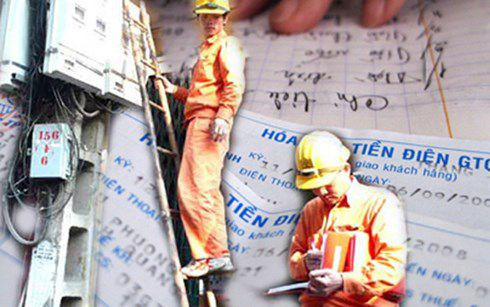EVN demands to increase electricity price according to exchange rate: "Borrowing the wind to break the bamboo"?
According to Dr. Nguyen Duc Thanh, demanding an immediate increase in electricity prices according to the exchange rate is the behavior of a monopolist, not the behavior of a competitor.
Public opinion is showing indignation at the fact that large corporations such as Electricity (EVN) and Coal and Mineral Industries (TKV) are complaining of losses of hundreds of billions of VND due to the adjustment of the USD/VND exchange rate and have proposed to include this loss in the cost of electricity and increase the electricity price. Dr. Nguyen Duc Thanh, Director of the Vietnam Institute for Economic and Policy Research (VEPR), affirmed: From an economic perspective, if a business demands an immediate increase in electricity prices following the increase in exchange rate, it is the behavior of a monopoly, not the behavior of a competitor.
Can only be an act of monopoly
 |
Dr. Nguyen Duc Thanh
According to Dr. Thanh's analysis, when the USD/VND exchange rate increases, all businesses (not just state-owned enterprises) cannot immediately increase product prices, even though most Vietnamese businesses have more or less imported inputs for production. Businesses do not dare to immediately increase prices following the increase in exchange rate because private businesses (not state-owned enterprises) themselves have to compete fiercely. They have to look at customers, always examine their competitors in the market to be careful with product prices, otherwise, it will be very easy to lose customers.
As for enterprises that want to increase product prices immediately according to the exchange rate, "they can only be enterprises with high monopoly. Because they are monopolistic, they do not have to compete with anyone, they do not have to worry about their competitors. For state-owned enterprises with monopoly, just because they want to increase prices, they have to ask for permission from the State, otherwise they would probably increase product prices immediately according to the exchange rate" - Dr. Thanh emphasized.
Observing business behavior from an economist's perspective, Dr. Thanh believes that demanding to increase product prices immediately following the increase in exchange rate is the behavior of a monopolist, not the behavior of a competitor. If there is competition, even if no one controls, businesses can increase prices as much as they want, but they do not dare to increase because they are afraid of competitors, afraid that customers will leave them for other competitors.
Therefore, the current move of the "big guys" in the electricity and coal industry to increase prices according to the exchange rate, according to Dr. Thanh, more than anyone else, they understand the "game", understand their monopoly role, so they "take advantage of the wind to break the bamboo" by increasing the exchange rate to: One, increase product prices exactly as they are forced to increase. Two, use excuses to increase product prices.
What is the basis for price increase?
Answering this question, Dr. Thanh analyzed: In principle, goods are made from many different input sources. If the input sources are imported, in this case, in USD, then the product cost can change according to exchange rate fluctuations, of course if the contracts for importing raw materials are still committed to the floating exchange rate. If the contract was paid 1-2 years ago and converted to USD, then this year will not be affected if USD/VND increases. For unpaid debts that have a floating commitment in USD, when the USD/VND exchange rate increases, it is correct to pay at the new exchange rate.
 |
Increasing according to exchange rate, electricity price cannot increase more than 5% (Illustration photo: KT)
Based on this, Dr. Thanh pointed out: After the exchange rate increased by 5% from the beginning of the year until now, if businesses want to increase product prices, the reasonable increase is only within the limit of the exchange rate increase and within the actual payment cost in USD, not increasing 100% of the cost of making up the product price according to the exchange rate.
For example, if the electricity industry (EVN) has input import costs accounting for 40% of product cost, then when the exchange rate increases by 5%, product cost can only increase by a maximum of 5% of the 40% of costs related to the exchange rate, which is equivalent to a 2% increase in product price.
Or the coal industry (TKV), assuming no imports, only depending on electricity, the cost of electricity in coal is only about 30%. At that time, increasing electricity price by 2%, the cost of coal only increases by 0.6%. If the coal industry demands a price increase of more than 5% to 10%, it is not right, especially the coal price cannot demand an increase equal to the increase in electricity.
Even though the coal industry says that because of the import of machinery and equipment, when the exchange rate increases, the cost of products must increase accordingly, it is not reasonable. Because the depreciation of this equipment must be divided over decades. For example, a debt of 1 billion USD for equipment purchase, and a payment of 100 million USD each year. At that time, if the exchange rate changes this year, the debt payment in USD will increase only this year (100 million USD), not the entire debt of 1 billion USD.
From this, it can be seen that if a business wants to increase product prices according to the exchange rate increase of 5%, the maximum increase in product prices cannot exceed 5%. Because no Vietnamese business has to spend up to 100% of production input costs from imports paid in USD.
Regarding EVN's desire to increase electricity prices to compensate for losses due to exchange rates, Dr. Thanh frankly said: EVN wants to increase electricity prices according to exchange rates, first of all, it must publicly and transparently disclose the source of production input costs related to exchange rates. Then, economic experts and people can easily calculate in principle how many percent EVN can increase electricity prices.
“If EVN proposes an electricity price increase rate that exceeds the economic principles, it means that you are deliberately using the exchange rate increase as an excuse to increase product prices to compensate for your other losses, not losses due to the exchange rate,” Dr. Thanh emphasized.
Need a transparent, objective and scientific price appraisal council
The above analysis, Dr. Thanh said, is only a principle. In reality, when businesses want to increase product prices according to the exchange rate, they will give many reasons to explain. But “their temptation to increase product prices more than necessary to compensate for the deficit caused by the exchange rate increase is very possible. Because this industry is not transparent, they can manipulate information. Moreover, they are in a monopoly position, so they are not afraid of how much or how little the increase will affect consumers and their competitors, because in reality they do not have to face this pressure”.
Meanwhile, if they are not monopolistic enterprises, they have to compete in the market, even though the pressure of exchange rate makes them increase product prices by 2%, but they only dare to increase by 1%. They would rather accept a decrease in profits than lose customers. This is because they are controlled by competition in the market and cannot act on their own like monopolistic enterprises.
Furthermore, a business that is responsible to itself, not to mention responsible to society, must have a risk reserve. When the exchange rate changes, the loss must first be taken from that reserve to compensate. If the company demands to increase the product price immediately according to the exchange rate, it proves that the business has no risk reserve.
Therefore, to avoid the situation of excessively increasing product prices based on the reason of compensating for exchange rate losses, according to Dr. Thanh, although transparency and disclosure of cost structure information are needed, it is still not enough. If a business reports a loss, the reason for the loss must be clearly identified. That is a matter of corporate governance and business efficiency.
In the long term, the Government must create a truly competitive environment so that businesses will compete with each other and prices will be balanced by the market. In the short term, "to prevent businesses from relying on exchange rate increases to increase electricity prices excessively, there needs to be an independent intermediary voice. Otherwise, EVN will submit to the Ministry of Industry and Trade, and if the Ministry's appraisal council is not objective, scientific, and transparent, it will be very easy to approve EVN's plan, even if the increase is unreasonable./.
According to VOV.VN






